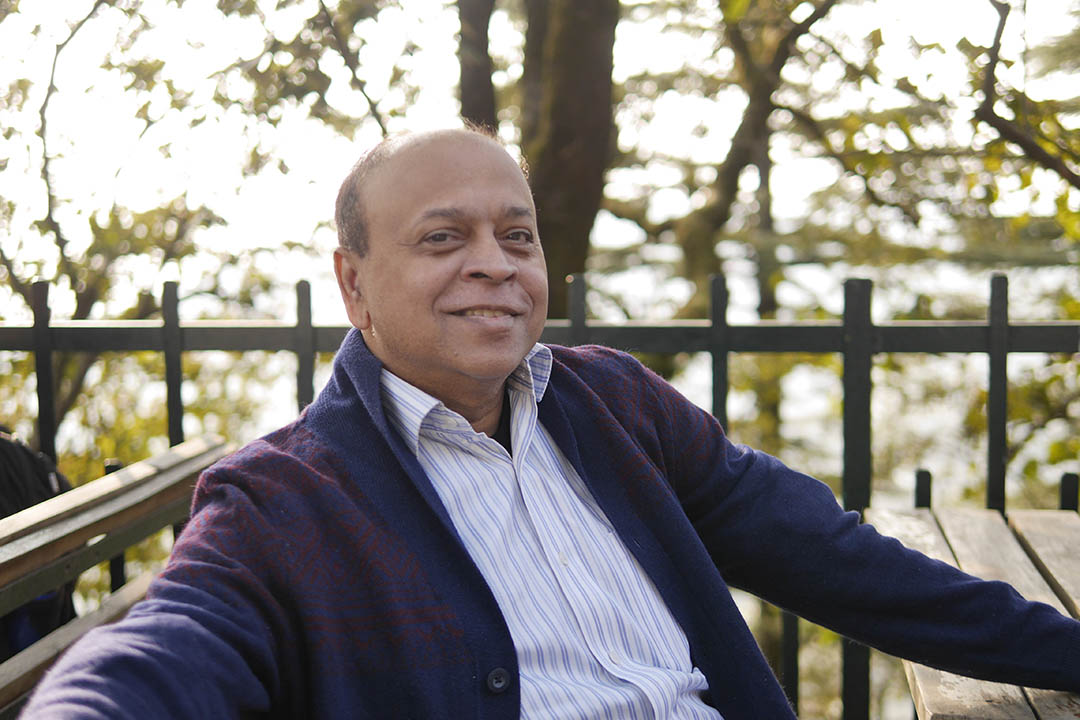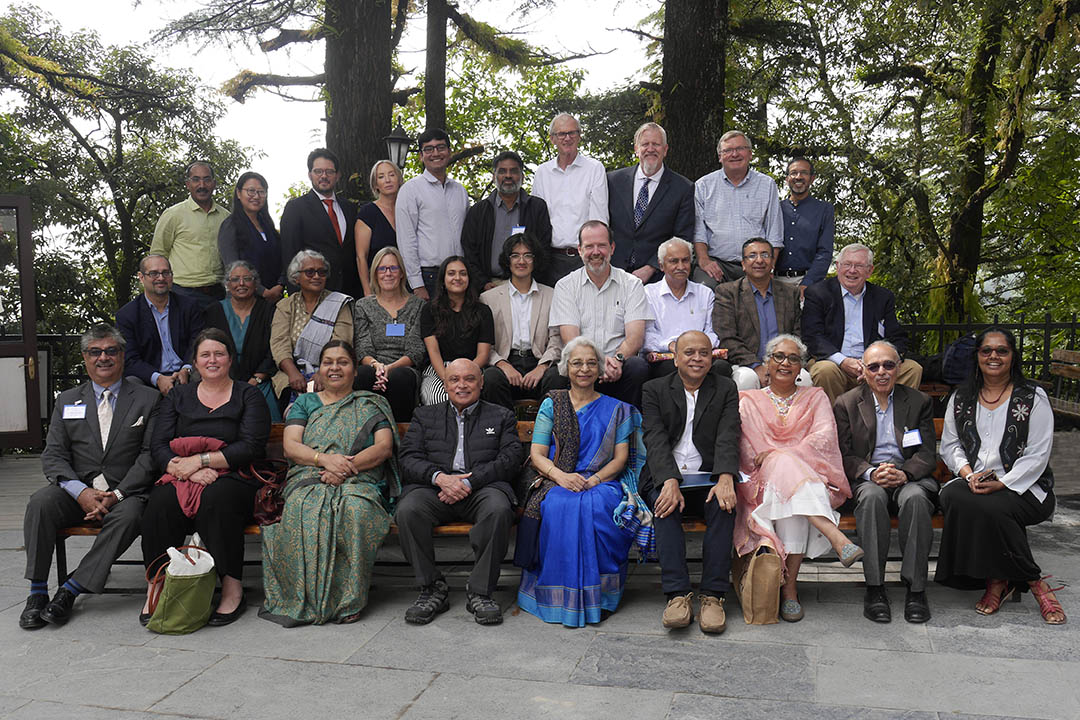
05 Dec Tribute to Thomas Chandy
Our Principal, Dr Craig Cook pays a tribute to Thomas Chandy, who served as the Woodstock School board president on two occasions and sadly passed away in November 2019.
As a community of learners, Woodstock School benefitted greatly from the life and leadership of Thomas Chandy. Thomas made significant contributions to Woodstock School, serving as Board President on two occasions, where he led with courage and conviction holding Woodstock to its mission, sometimes at deep personal cost. In his love for the Woodstock community he led with vision, dedication, and love for all whom he encountered.
What was it in Thomas that brought the best out in our Woodstock community? In the Woodstock mission statement, it says, “Woodstock School strives for excellence in teaching and learning, offering an exceptional education in a diverse international community. Inspired by our Indian Himalayan environment and our inclusive Christian tradition, we develop visionary, articulate and ethical individuals equipped to achieve their full potential in leadership and in life.”
In bringing the best out of Woodstock, Thomas led with our identity as a Christian School, as this meant for him that we took the role of a servant in all that we did as followers of Christ. This meant that we cared for those who are most vulnerable in our midst. This meant that we always sought for ways to help the most needy in our surrounding community. All of these markers of following Christ were seen in our master identity of being a servant of all.
While leading and loving, Thomas did so in a way that was borne out of resourcefulness, always cognizant of scarce resources and the importance of being a good steward of all that God has blessed us with.
Beyond our identity, Thomas led us to meet the best of our mission in being an “inclusive Christian community” in our daily practices, whereby all were welcome, whatever one’s faith, whatever one’s culture, and whatever one’s family background. Thomas saw diversity as expressed in a Christian school community as a strength and something to be leveraged in preparing students to deal with difference in a complex and pluralist world.
While Thomas lived out the mission of Woodstock School in both practice and spirit, his life also reflected the ideals of our school community, which can be found in our five guiding principles which shed light on our practice as individuals and as groups of people on the Woodstock campus. These guiding principles begin with eliciting greatness, and move to compassion, well-being, wholeness, and finally, treading lightly on the earth.

Thomas with the rest of the Woodstock School Board and General Body in 2019.
In Thomas’ life he caught the spirit of what it meant to elicit greatness from others. This principle reinforces the power of encouragement, example and service to others as the framework within which we understand the function of leadership roles. This is achieved by actively looking for ways to draw out and support the growth of those we lead, to develop the potential of others and to enable them to be more and to achieve more through this relationship. In this sense, everyone is a leader – for everyone has the power to influence others for good and to draw out their greatness. This view of leadership is about creating the inner conditions and commitments from which positive outer influence can emerge as integrity and trustworthiness. When these personal foundations are developed, leadership techniques and strategies will be meaningful and effective, tapping into those energies which can truly inspire and eliciting the greatness within. I can speak personally of how Thomas lived these ideals out in his interaction with leaders and students on campus. In seeking to bring the best out of others, he lived out the very practice articulated above, which was to serve others. As Jesus said, “The greatest among you is your servant.” Thomas lived this out in front of our community.
Thomas saw our students as being whole in need of a holistic education where students were taught not only to lead with their minds and critical thinking, but to lead with courageous hearts that saw both larger societal problems, within a context of profoundly human dimensions.
In seeking compassion as another of our guiding principles, we say, “In our care for students and for one another, we favor the compassionate path. With those who fail, our focus, wherever possible, is on restoration, forgiveness and learning. When it comes to our philosophy of care, following rules and implementing policy are not ends in themselves. Our goal is to maintain relationships, to safeguard trust, to encourage honesty and integrity, and to advocate for compassion and hope.” Thomas lived compassion out within our community, as whenever he had to exercise his own authority in a given situation he always erred on the side of human compassion to those who may have been impacted. In leading the community, it was clear that he led first with his heart for people, and a heart full of compassion.
In seeking well being as the third of our guiding principles, we say, “To see Woodstock as a community rather than an institution is to recognize the centrality of the human dimension in all that we do. We seek to be a safe place in which everyone acts with regard for the intellectual, physical, spiritual and emotional well-being of others.” Foremost in Thomas’ mind, was the welfare, safety, and thriving of the children entrusted to our care. As a community, Thomas sought to courageously address any issue that was broken and sought the well-being of all and was never afraid to take the lead in ensuring that all were well within the community. He lived out God’s call on his life to care for the oppressed, to meet the needs of the vulnerable, and to stand for those without access to power.
In trying to promote the fourth of our guiding principles, seeking wholeness, we say, “At Woodstock we believe that a meaningful education provides not only academic skills and attributes, but must also provide emotional, spiritual and physical wholeness – within ourselves, in our interpersonal relationships, and within the local and global systems we inhabit. Our focus is, therefore, on making wholeness central to the school experience. This includes making sure our planning and decision making supports the living of what Parker Palmer calls, “undivided lives” – in other words, lives that are characterized by integration and integrity in a world dominated by fragmentation. In Practice: Seeking wholeness means that we must always live and work from a clear sense of the big picture. Nothing that we do should be done because it seems pragmatic or expedient. We must always look for congruence with our underlying principles.” Thomas saw our students as being whole in need of a holistic education where students were taught not only to lead with their minds and critical thinking, but to lead with courageous hearts that saw both larger societal problems, within a context of profoundly human dimensions.
Lastly in seeking to tread lightly on the earth as our fifth guiding principle we believe, “In our allocation of resources, we conserve and regenerate the natural environment we inhabit; at the very least, causing no harm – in essence, we tread lightly on the earth. This principle compels us to model, with integrity, a credible and carefully considered approach to the natural environment in the allocation of every resource.” While leading and loving, Thomas did so in a way that was borne out of resourcefulness, always cognizant of scarce resources and the importance of being a good steward of all that God has blessed us with.
In these many ways, Thomas lived a life that modeled all that we want for our students at Woodstock School as we prepare them for life and leadership in the 21st century. This is the strong legacy that Thomas leaves for us all, to be a servant, to care for the most vulnerable in our midst, and to do so with a heart of compassion.
Dr Craig Cook
Principal






No Comments